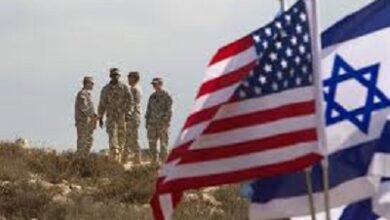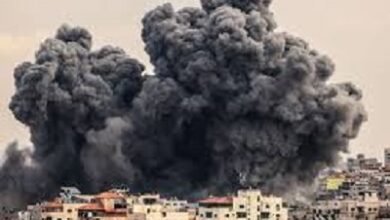Third Round War between the Arakan Army and the Myanmar military !!!
Editorial:- S K Singh: Editor-in-Chief

WAR-REPORT:- The role Rohingya leaders could play in averting further violence includes discouraging community members from taking up arms where there is a choice. The risk of retaliation means that community leaders in both Rakhine State and Bangladesh are often unable safely to speak out against armed actors, including both the Myanmar military and Rohingya armed groups. The diaspora thus plays a significant role in shaping the views of Rohingya people and how they see the conflict.

It is important that they keep the big picture in mind – that there is still a possibility to build relations between the Arakan Army and the Rohingya when the military is not stirring up conflict – and carefully consider how they talk about communal dynamics in Rakhine State, as well as the way in which they present potentially inflammatory information online.
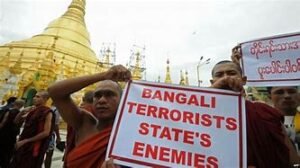
The hostilities in Rakhine State constitute the third round of combat between the Arakan Army and the Myanmar military, following a brutal two-year war that ended with a ceasefire in November 2020 and a brief, but intense outbreak of fighting in the second half of 2022.
With the military distracted by war , the Army has tightened its grip on the areas it controls since the February 2021 coup, setting up its own administration there and boosting its military capacity. The major offensive it launched six months ago has allowed it to expand its territory, to the extent that it now holds nine entire townships in the centre and north, as well as much of the Bangladesh border.
Finally, international actors should increase their support for Rohingya in the sprawling refugee camps, including for protection services that can undermine the recruitment campaigns of armed groups. Among other ill effects, diminishing aid risks prompting more young men to join the ranks of armed groups, if only to get a steady wage.

They should also press Bangladesh to take stronger action against armed groups’ recruitment campaigns, both to protect individuals from harm and to preserve the civilian character of the refugee camps. Inside Rakhine State, foreign actors should continue to support Rohingya in internment camps around Sittwe and encourage the Arakan Army to expand humanitarian access in Rakhine so that much-needed assistance can reach members of all ethnic communities in the central and northern parts of the state.

As the Arakan Army advances, and the Myanmar military reaches for every possible tool to stop it, the fate of communal relations in Rakhine State is hanging in the balance. If a Rohingya insurgency emerges – particularly one pitted against the powerful ethnic armed group – it can only lead to more bloodshed and misery in communities that have seen too much of both. There is still a chance for the parties to step back from the brink. All who have influence should be working to make sure they do so.
Dropping the use of the term “Bengali”, and more clearly reiterating its commitment to extending rights to Rohingya that the Myanmar state has long denied them – such as freedom of movement, economic rights and access to essential services – would be a good place to start. The Arakan Army should also avoid using Rohingya villages as launchpads for attacks on the military, to spare Rohingya civilians the threat of regime reprisal.

It should additionally publicise a clear code of conduct for its soldiers, commit to investigating credible allegations of wrongdoing by its forces and take clear, visible and proportionate action against offenders. To nurture better relations between the two communities, it should also integrate more Rohingya into its administration, including at higher levels.
In charting its course, the Arakan Army should be cognisant of the heightened international attention to rights violations in Rakhine State due to the military’s campaign against the Rohingya in 2017.
The scrutiny includes an investigation at the International Criminal Court, allegations of genocide being adjudicated at the International Court of Justice, which has ordered provisional measures to protect the Rohingya, and the establishment of accountability mechanisms such as the Independent Investigative Mechanism for Myanmar, which is mandated to collect evidence of serious international crimes committed in Myanmar regardless of the perpetrator’s affiliation or official capacity.
If the Arakan Army were to be implicated in abuses, both its legal exposure and its standing would suffer, not only with the Rohingya in the areas it administers, but also with neighbouring states and other international actors.
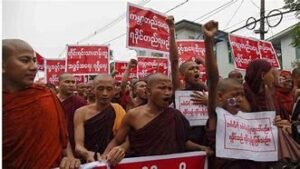
Talks between the Arakan Army and prominent Rohingya could help. Although the absence of unified Rohingya leadership complicates matters, the Army’s commanders should establish a regular dialogue with Rohingya leaders to help overcome the rising mistrust on both sides. Bangladesh could facilitate this dialogue, and has a strong incentive to do so, given that it wants the more than one million refugees it hosts to be able one day to return to Rakhine, which for the foreseeable future is likely to be under Arakan Army control. Dhaka and its law enforcement agencies should take immediate action to prevent Rohingya armed groups from recruiting in the refugee camps and work to stem their sources of funding and weapons. A Rohingya armed group is not the answer to either the refugee crisis or the plight of Rohingya still inside the country.

In recent days, the Arakan Army has expanded its offensive in northern Rakhine, capturing several key military sites. It appears almost certain that the group will, in the weeks and months ahead, secure control of both Maungdaw and Buthidaung, the two townships where the vast majority of Rohingya who remain in Rakhine State live.
But while it may succeed militarily, if the group wants to emerge from this war with the hope of consolidating peace in the areas under its control, then it needs to tread carefully. While it is the Myanmar military that has most actively inflamed inter-communal tensions in northern Rakhine and could most easily defuse them, it is unlikely to do so. The Arakan Army’s unhelpful statements, together with allegations of human rights abuses, are making an already tense situation worse.
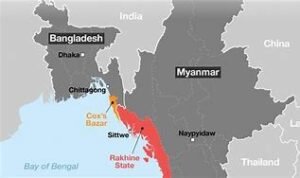
These strains are largely due to the Myanmar military’s actions, including a massive mobilisation campaign. On 10 February, junta chief Min Aung Hlaing announced that the regime had activated a dormant conscription law, making all young men and women across the country eligible for compulsory military service.
In other parts of Myanmar, hundreds of thousands – mostly young men – have fled abroad or to areas beyond the junta’s control to avoid having to fight for the widely hated regime. The Rohingya, however, have few places to run to.
Although authorities in Myanmar have long persecuted the Rohingya, including by denying citizenship to the vast majority of them and constraining their freedom of movement, the military has no qualms about using them as cannon fodder against the Arakan Army.
Facing the prospect of further defeats in Rakhine, the regime has conscripted Rohingya men from villages across the state’s north, where the Rohingya still make up most of the population, and from internment camps near Sittwe, where some 130,000 continue to live after being forcibly displaced following the 2012 violence.
SOURCE-ICG





